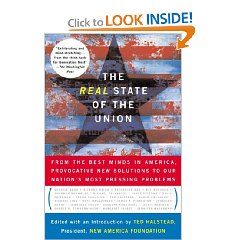
First Class Thinking, Morally Sound, Offer Hope,
The book is ably summed up in the Preface, which states that neither party has proven capable of offering a coherent, honest, or forward-looking agenda to guide America. Peter Peterson, Chairman of the Council on Foreign Relations and author of Running on Empty: How the Democratic and Republican Parties Are Bankrupting Our Future and What Americans Can Do About It would certainly agree, as do I. It is my hope that this group might coalesce around someone like Senator Collins (R-MA) running with Governor Warner (D-VA), and announcing a coalition cabinet and one commitment: to electoral reform. Karl Rove knows how to steal close elections, the only way to beat him is to field a multi-party TEAM that can win by a LANDSLIDE. America is ready for that, and the ideas in this book are all implement able by such a team approach to what might be called “networked governance.”
While I have six pages of notes on this excellent volume, still relevant to the future, I will touch on just a few highlights:
1) Mass middle class is vital, and Washington has destroyed that base for democracy.
2) American people are not as polarized as their extremist political leaders
3) Our humans are productive but our processes are not. I am reminded of the book in the 1980's on “Human Scale.” The federal government has indeed become dysfunctional, running at 3-5 mph while the rest of us are going 100 mph.
4) Need a new social contract. Authors identify the first one as building a nation, the second as healing from the civil war, and the third as building a middle class. We need to re-build the middle class with governance that again represents the citizens and their communities rather than predatory corporations.
5) Private sector, not just government, needs reform.
6) Health care can shift from business to government, and in the process we can find $60 billion a year in savings by using information to create metrics to reduce waste and over-treatment. The author discussing this suggests that 20-30% of what we spend on health care is waste. They do not discuss medical tourism, which I find quite interesting as a trend.
7) We need a nation-wide industrial policy that restores the relationship between business, community, and family, while also restricting the mobility of capital unless it restores the social contract with labor.
8) Radical tax reform could yield $200 billion a year (the author's say this is a low estimate, I agree, import-export tax fraud alone is $50 billion a year, I think the number is closer to $500 billion a year).
9) Take back the airwaves in the public interest.
10) James Pinkerton is brilliant in explaining the three eras of education as agricultural (nine-month school year), industrial (rote learning) and experimental (nostrums at expense of basics). See also Derek Bok's piece on “Reinventing Education at Forbes.com. James missed the opportunity to discuss how free universal access to all knowledge, and using serious games to educate on a just enough, just in time basis, in all languages, could reconfigure education world-wide.
11) Matthew Miller (see my review of his superb book, The Two Percent Solution: Fixing America's Problems in Ways Liberals and Conservatives Can Love) outlines what $30 billion could buy in terms of moving teachers up the food chain. Just in passing, if we cut our grotesquely ineffective intelligence community back from $60 billion a year to $30 billion a year, we can create a truly smart nation (see my book coming out on 11 September, THE SMART NATION ACT: Public Intelligence in the Public Interest and in passing get better secret intelligence in the context of a national Open Source (Intelligence) Network that feeds not only the spies and diplomats, but also the schoolhouses, statehouses, and social clubs.
12) A thread that I found interesting throughout the book is how we lack the information needed to make smart choices. We lack statistical information on medical treatments and results that might allow “evidence-based medicine.” As I have pointed out elsewhere (Google for <ten threats, twelve policies, and eight challengers>), the U.S. Government is remarkably ignorant and uninformed across all these areas.
13) The rest of the book on aging productively, incentivizing exercise and penalizing fast food, on rebuilding the heartland with information infrastructure, on mixed races where third generations inter-marry at a 55% rate, on conflicted Muslims, on “opportunity lost” in foreign affairs and national security, all top notch.
The book ends brilliantly, as it began, with a commentary on the dysfunctional duopology of the extremist Republicans where dogma trumps honesty, and the divided Democrats trapped in the past. As the founder of a small non-rival party blog, Citizens-Party.org, I consider this book, and the New America Foundation, to be the people's voice at a time when the Congress and the White House most certainly are not.




